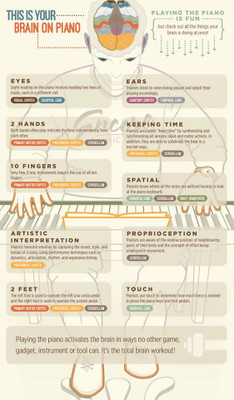This is your Brain on Piano
Lisa Darmanie, Founder/Director Alabanza Music on 1st Mar 2018
They say a picture says a thousand words and this photo showing what's going on in your brain as you play piano says a great deal! Being actively engaged in music making involves so many different functions and activities we take for granted that are happening in our body, but it all starts in our brain.

In our Parent Orientation session this week, we spoke about two of these vital features; proprioceptive input and musicality (artistic interpretation). In simple terms proprioception is what helps students find and play the keys on the piano, knowing how much effort is needed to perform legato (smoothly) or staccato (short/detached), even depressing the pedal just at the right moment in the phrase all while listening to the other musicians while keeping their eyes on the sheetmusic or communicating with the audience. Now that sure does sound like a handful to coordinate!
Often times, when I glimpse students looking down to find where to put their fingers , I would ask them "so how do people who can't see play?" or "Do you need to look at your feet to know how to walk?" Then I would encourage them to practice with their eyes closed, not just to be able to trust their brain to communicate to their muscles and joints to comfortably find the notes, but to be able to hear themselves.
Sometimes students struggle so much with finding the notes they never really get to hear themselves to critique their own sound or discover what more they can do to put their own "feel" or personality or emotion into the music- that's why we need musicality!

If music was just about playing the right notes at the right time then we would be more than happy to listen to music programmed and performed by a robot/computer. Everytime I scored music for the steelband or jazz band on my notation software Finale, I always find it sounds so hilarious (as if it were a cartoon) but when the band performs it live, I am always blown away! The players just bring the arrangements to life.
We go to concerts, listen to music of our favourite artistes with our special playlists because they transmit something in the way they perform that touches our heart, our mind, our spirit, our soul.
I encourage you, as we make music together, whether it's in Musikgarten class or in Instrumental class, Family Music time at home or in the car, to practice until you've got the music memorized, so you don't have to try to remember the lyrics, the melody, the chords or the sequence. Sing it, play it, perform it until you can absolutely close your eyes and just enjoy it!



